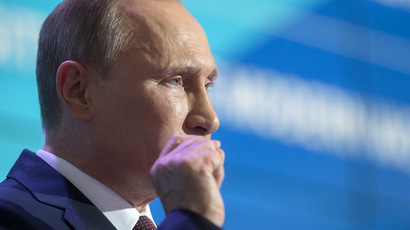'Our children will thank us if we prevent another Cold War': Russian director grabs US award
Against an unavoidable backdrop of political tension, a prominent pro-Putin Russian director has received a high-profile American prize for developing cultural ties between the United States and Russia.
Initiated by the American University in Washington, for over two decades the American-Russian Cultural Cooperation Foundation (ARCCF) has honored Russians, who have made an impact on US culture, and vice-versa.
With cinematography and photo journalism chosen as this year’s theme, the prize was awarded to Karen Shakhnazarov, a member of the new wave of Soviet directors who rose with the Perestroika in the 1980s, who continues to make films today.
“I was born and grew up during the Cold War, and our countries are now on the edge of a new Cold War. And I do not want for a young generation of people from these two countries to repeat this experience,” Shakhnazarov told the audience at the gala dinner, who had paid up to $50,000 for a table.
“Maybe when we are gone, our children will thank their fathers for making this world a little better – each person can do something.”
Considered a social liberal, Shakhnazarov, an ethnic Armenian, has been a notable public supporter of President Vladimir Putin. In March, he signed a public letter “endorsing the course chosen by Vladimir Putin in Ukraine and Crimea.”
But away from politics, Shakhnazarov, whose film The Assassin of the Tsar from 1991, was shown to film students a day before the award ceremony, was effusive.
“I am totally taken aback – I haven’t seen such a high-powered or grateful audience in a long time. This is no achievement of mine or ours – it is the people here in the US, who are organizing this with motives that are evidently humanitarian and sincere,” he told RT in an off-stage interview.

The recipient of an identical award from the American side, John Fahey, the chairman of the National Geographic Society on whose behalf he'd accepted it, told the black-tie crowd that the first US geographic photo expedition to Russia took place in 1896, and the partnership has survived a sequence of dramatic upheavals, compared to which the current stand-off is just a blip.
“It’s not been as easy this year for a variety of reasons, but we feel comfortable going ahead and doing the scientific work, because the work we are doing is in parts of the world where we need the co-operation of other countries. I think our relationships are important so that we can further science, despite what is going on in the political field,” Fahey said to RT.
“We are not in a position of saying ‘no’ because of the current situation – we are trying to get to a place that’s better, which we will.”
More than 12,000 people have attended events organized by ARCCF since it was set up in 1992, and previous winners have included the late cellist Mstislav Rastropovich, and conductor Valery Gergiev.
John Beyrle, the US ambassador to Russia during Barack Obama’s first term, which was marked by a “reset” in relations between Moscow and Washington, insisted that as economic ties between the two countries flounder under the weight of sanctions and geopolitics, symbolic cultural ties will become more important again.
“From my experience working in Russia, there is still too much misunderstanding between Russians and Americans, not just at the government level, but at the personal level,” the diplomat, and member of the ARCCF board, told RT.
“Cinema and photography have tremendous influence and tremendous power to influence people and to reduce stereotypes, dispel misunderstanding and even ignorance.”













